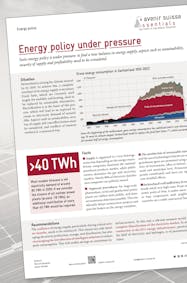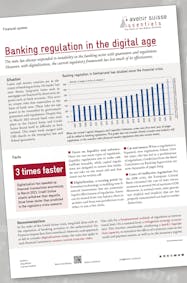Switzerland is neither a tax haven nor a fiscal paradise. The burden of tax, social security and other compulsory levies is higher than many Swiss realise, and the tax and transfer system is opaque, complex and too diffuse. Avenir Suisse’s latest publication offers a comprehensive study of the strengths and weaknesses of the tax policies of the federal and cantonal governments. It calls for a coherent package of reforms to secure Switzerland’s attractiveness as an investment location and further increase its prosperity. The goals are lower taxes on private saving and investment, the end of tax relief on borrowing and a more focused redistribution of fiscal resources.
On average, about 55% of every Swiss adult’s income is sucked up by tax, social security and other compulsory charges. Around half is returned via pensions and other financial benefits. The process involves a highly diffuse redistribution, entailing heavy administrative costs and creating disincentives to work – particularly for secondary income earners.
Such a weighty burden makes a transparent and clearly targeted tax and transfer system all the more important. In the report, co-authors Marco Salvi and Luc Zobrist call for fundamental changes, summed up in 13 major reforms.
Central to their argument is shifting taxation away from individuals’ savings and investment towards consumption. But that change should not come by yet more hikes in value added tax, but rather through refocusing existing income and corporate levies on a more „consumption orientated” basis. Tax should fall on what is taken out (ie consumed) from the economy, not what is contributed to it.
Key themes
- Restoring the attractiveness of private saving
Switzerland’s current tax system penalises saving. Avenir Suisse suggests introducing a new levy that would only kick in when returns on capital, or capital gains, exceeded yields on Swiss federal government bonds. Savings income would become effectively tax tree, while the “Eigenmietwert” (a peculiarly Swiss fiscal concept that potentially disadvantages home owners by attributing a notional rental value to their properties) would only be taxable once it exceeded the same level. In return, tax relief on interest payments, including mortgages, would be eliminated, removing the current incentive to borrow – and thereby reducing the risk of housing bubbles. - Radical rethinking of wealth tax
The report also corrects the misapprehension that wealth is taxed only lightly in Switzerland. It shows that levies on interest and dividends, along with wealth tax, can lead to marginal rates of more than 100%. Tax at such levels is confiscatory and saps innovation and entrepreneurship. Wealth tax should be abolished and replaced with a property tax, a comprehensive capital gains tax or, if necessary at all, a moderate inheritance tax. - Lower corporate tax to ensure fiscal competitiveness
One particular area of focus in the report is company taxation. In recent decades, Switzerland has been more adroit than most countries in attracting mobile foreign companies. Although the average tax rate of 11% for companies enjoying such privileges is notably lower than for normally taxed groups, the revenues generated per company are six times higher. That means any exodus by such groups would cause a big loss of revenue. Recent measures proposed by the federal government and the cantons go in the right direction, But, based on the latest fiscal thinking, not all the steps can be said to be of the same quality. Most convincing are those measures with a clear economic justification, such as reducing rates of cantonal profits tax and introducing relief for the costs of shareholders’ equity. A unitary, low, corporate tax rate in each canton would ensure Switzerland’s long term fiscal competitiveness.






